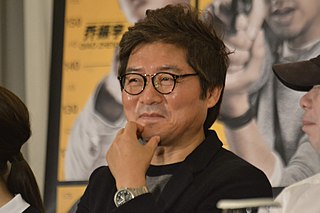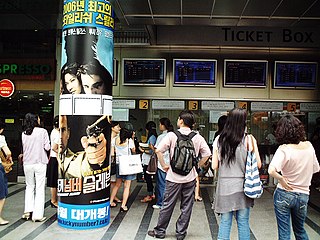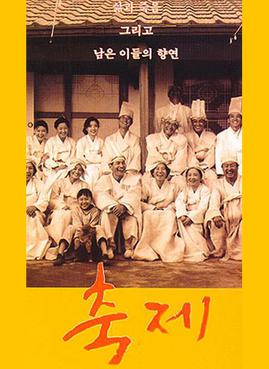| Lists of South Korean films by year |
|---|
 |
| Korean Animation |
A list of films produced in South Korea in 1996:
| Lists of South Korean films by year |
|---|
 |
| Korean Animation |
A list of films produced in South Korea in 1996:
The year 1996 involved many significant films. The major releases this year included Scream, Independence Day, Fargo, Trainspotting, The Rock, The English Patient, Twister, Space Jam, Mission: Impossible,Mars Attacks!, Jerry Maguire and a film version of the musical Evita.

Kim Ki-duk was a South Korean film director and screenwriter, noted for his idiosyncratic art-house cinematic works. His films have received many distinctions in the festival circuit, rendering him one of the most important contemporary Asian film directors.

Paju is a city in Gyeonggi Province, South Korea. Paju was made a city in 1997; it had previously been a county (gun).

Choi is a Korean family surname. As of the South Korean census of 2015, there were around 2.3 million people by this name in South Korea or roughly 4.7% of the population. In English-speaking countries, it is most often anglicized Choi, and sometimes also Chey, Choe or Chwe. Ethnic Koreans in the former USSR prefer the form Tsoi (Tsoy) especially as a transcription of the Cyrillic Цой.

Hong Sang-soo is a South Korean film director and screenwriter. An acclaimed and prolific filmmaker, Hong is known for his slow-paced films about love affairs and everyday dilemmas in contemporary South Korea.

The Busan International Film Festival (BIFF), formerly the Pusan International Film Festival (PIFF), held annually in Haeundae-gu, Busan, South Korea, is one of the most significant film festivals in Asia. The first festival, held from 13 to 21 September 1996, was also the first international film festival in Korea.

Kang Je-gyu is a South Korean film director.

Bong Joon-ho is a South Korean film director, producer and screenwriter. The recipient of three Academy Awards, his filmography is characterised by emphasis on social and class themes, genre-mixing, black humor, and sudden tone shifts.
List of Korean films may refer to:

South Korean films have been heavily influenced by such events and forces as the Korea under Japanese rule, the Korean War, government censorship, the business sector, globalization, and the democratization of South Korea.

Jung is a Latin alphabet rendition of the Korean family name "정", also often spelled Jeong, Chung, Joung or Jong. As of the South Korean census of 2015, there were 2,407,601 people by this name in South Korea or 4.84% of the population. The Korean family name "정" is mainly derived from three homophonous hanja. 鄭 (2,151,879), 丁 (243,803) and 程 (11,683). The rest of the homophonous hanjas include: 政 (139), 桯 (41), 定 (29), 正 (22) and 情 (5).
Korean rock is rock music from South Korea. It has roots in American rock, which was imported to South Korea by U.S. soldiers fighting in the Korean War and stationing in U.S. military bases in South Korea after the war. Around the U.S. military bases, local musicians could have opportunities to learn American rock music and perform it on stage for U.S. soldiers. As a result, many Korean rock bands, called Vocal Bands or Group Sound, started their musical careers in the 1960s. Under the military administration in the 1970s, rock music and its subculture were classified as a depraved youth culture and restricted. After the Korean Fifth Republic, the censorship policies under the military government were abolished and rock music became a mainstream genre in South Korea until the end of the 1980s. Today, rock music is not the main genre in the music market in South Korea, but it still occupies a big portion of music consumption in the nation.
This is a list of films by year produced in the country of South Korea which came into existence officially in September 1948. The lists of Korean films are divided by period for political reasons. For earlier films of united Korea see List of Korean films of 1919–1948. For the films of North Korea see List of North Korean films. For an A-Z list of films see Category:Korean films.

Showbox Co., Ltd. (Korean: 쇼박스) is a South Korean film distribution and production company. It is one of the largest film distribution companies in South Korea, founded in 1999. Showbox is the film investment, production and distribution branch of Mediaplex, Inc., entertainment arm of Orion Group. Its main competitors for domestic box office are CJ Entertainment, Lotte Entertainment and Next Entertainment World. Despite having very short history in the industry, they managed to have top 6 of 10 blockbusters in Korean box office history, number 1 being 2012's The Thieves.

Festival (Korean: 축제) is a 1996 South Korean drama film directed by Im Kwon-taek, and based on the novel of the same title by Lee Cheong-jun.
The Baeksang Arts Awards, also known as the Paeksang Arts Awards, are awards for excellence in film, television and theatre in South Korea. The awards were introduced in 1965 by Chang Key-young, the founder of the newspaper Hankook Ilbo, whose art name was "Baeksang". It was established for the development of Korean popular culture and art and for enhancing the morale of artists. They are regarded as one of the most prestigious entertainment awards in South Korea.
Park Chul-soo was a South Korean film director, producer, screenwriter and occasional actor. He was one of the most active filmmakers in Korean cinema in the 1980s and '90s.
Park Gok-ji is a South Korean film editor. She is married to film director Park Heung-sik, with whom she has several children, and she used her influence within the local industry to aid the production of his second film, The Railroad. Park and her colleague Jeong Jin-hee won Best Editor at the 5th Korean Film Awards for A Dirty Carnival, and received a further nomination for Best Editor at the 1st Asian Film Awards.

The 1996 Gangneung submarine infiltration incident began on 18 September 1996, near the South Korean city of Gangneung when North Koreans abandoned their grounded submarine, and hid within the city resulting in 49 day long manhunt for the belligerents.